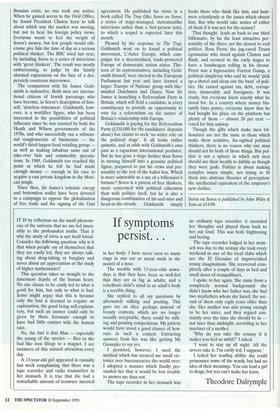If symptoms
persist.. .
IT IS by reflection on the small phenom- ena of the universe that we are led insen- sibly to the profoundest truths. That is why the study of trivia is not itself trivial. Consider the following question: why is it that when people say of themselves that they are easily led, they are always talk- ing about drug-taking or burglary and never about art appreciation or the study of higher mathematics?
This question takes us straight to the innermost depths of the human heart. No one claims to be easily led to what is good for him, but only to what is bad. Some might argue that this is because only the bad is deemed to require an explanation, the good being self-explana- tory, but such an answer could only be given by those fortunate enough to have had little contact with the human race.
No, the fact is that Man — especially the young of the species — flies to the bad like iron filings to a magnet. I see instances of this natural attraction every day.
A 13-year-old girl appeared in casualty last week complaining that there was a tape recorder and radio transmitter in her stomach. It is true that she had a remarkable amount of ironware inserted in her body: I have never seen so many rings in one ear or metal studs in the nostril of a nose.
The trouble with 13-year-olds nowa- days is that they have been so well-fed that they are as big as adults; and a rebellious child's mind in an adult's body is a terrible thing.
She replied to all my questions by alternately sulking and pouting. This gave me an idea: perhaps instead of beauty contests, which are no longer socially acceptable, there could be sulk- ing and pouting competitions. My patient would have stood a good chance of hon- ours in such a contest. Extracting answers from her was like getting Mr Gromyko to say yes.
I persisted, however. I used the method which has secured me small vic- tories over bureaucracies the world over: I adopted a manner which finally per- suaded her that it would be less trouble to answer me than not.
The tape recorder in her stomach was no ordinary tape recorder: it recorded her thoughts and played them back to her out loud. This was both frightening and boring.
The tape recorder lodged in her stom- ach was due to the ecstasy she took every weekend in one of the local clubs which are the El Dorados of impoverished young imaginations. She recovered com- pletely after a couple of days in bed and small doses of tranquillisers.
I spoke to her again. She came from a completely normal background: she didn't know who her father was, she had two stepfathers whom she hated, the sec- ond of them only eight years older than she. Her mother was also young enough to be her sister, and they argued con- stantly over the time she should be in not later than midnight, according to her martinet of a mother.
`Why do you take the ecstasy if it makes you feel so awful?' I asked.
'I want to stay up all night. All the uvvers take it. I'm easily led, I suppose.'
I tested her reading ability: she could pronounce some of the words, but had no idea of their meanings. You can lead a girl to drugs, but you can't make her learn.
Theodore Dalrymple


































































 Previous page
Previous page